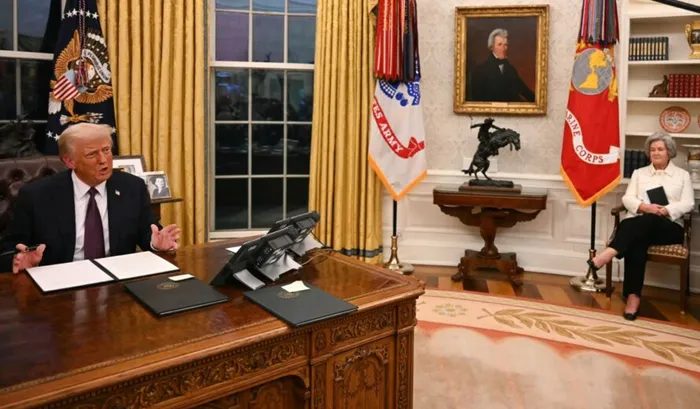Part 2: What Donald Trump’s inauguration means for global and South African markets

Incoming White House Chief of Staff Susie Wiles watches as US President Donald Trump speaks to journalists in the Oval Office of the White House in Washington, DC, on January 20, 2025. Picture: Jim WATSON / POOL / AFP
If you want to link that at all to Trump and his policies, I would argue that, well, if Trump hits us with some trade tariffs as well, that will immediately add another layer to anybody that would like to come and open a factory here or make investments in South Africa, because then over and above just the normal local challenges that we face, those kind of investors will need to take into account that then they also need to deal with additional tariffs over another hurdle if they would like to trade and operate from.
On inflation trends, maybe more broadly, I think some of the most important policy changes that's on the table is around trade, as we already said. Trade is generally growth negative because it adds an additional hurdle for free trade, and it's also inflationary because you end up paying more for those products.
So, that policy from the Trump camp is definitely inflationary, not only in the US, but all around the world. If we think about his other important one, his immigration. So, if he does get rid of a lot of illegal immigrants or not legalise them, that reduces the supply of affordable labour.
So, that is also growth negative and definitely inflationary. And on the fiscal side, in terms of the spend that they want to do is also inflationary. That one might be slightly growth positive.
But so, if you look at the net impact of Trump policies for the US, and you can also argue them for most part of the world, is slightly inflationary. So, we’re already sitting with global inflation in most countries finding a floor. It seems like we’re not going to go back to the levels we’ve seen before the pandemic.
It is a little bit more sticky.And then if you add to that Trump policies and the trend that might be inflationary brings us back to the point that most central banks that started cutting rates at the back end of 2024, we might not see as many cuts as expected before. And for some of them, they might actually be close to the end of their cutting cycle, given the potential for inflation under Trump.
Therefore, without Trump, a lot of our issues are still homegrown. So, the quicker we can fix those, and that's all from reliable energy supply to roads, rail, port, ease of doing business. The sooner we can do that, the sooner we put us in a position to be more competitive globally.
So, that should really be the focus. We shouldn’t focus too much on Trump and rather start trying to address the issues that we can control back home. That should be the focus.
Then again, and our government's been trying to do that, is to still build relationships with the US. They’ve sent a couple of teams to go and talk to the US on the back of the review of the agreement. It's to be open-minded and see if we can continue to build and strengthen our relationships with the US.
And maybe with the G20 coming up, that is a great opportunity for SA to showcase what we can do locally in terms of hosting an event like that, but also what the country's got to offer. But the focus should really be to fix our local issues. That would put us on a very strong footing going forward.
I think what local business should do is just to be aware that with Trump coming in, that there's going to be a lot of moving parts. But in a way, the world is going to go through a bit of a turbulent time. Things are going to readjust.
Other trading opportunities are going to arise. And I think for business and for SA, we need to be wide awake for those opportunities. If Trump wants to trade less with certain countries or blocks, that will open the door to trade with other countries and blocks.
It will change currencies around the world, which will change competitiveness. So I don’t think it's a net negative outcome. And the world will need to adjust in terms of maybe finding other trading partners and also rethinking about how they can improve efficiencies.
And that includes SA and SA business as well. For SA investors, with Trump coming into the scene, there will always be opportunities. Yes, like I’ve said, Tehran can be under pressure, but there’s also options where China can stimulate that can support Tehran again.
So all of this talks about a well-diversified portfolio. But we're not facing an end-of-the-world scenario, a severe bear market, having investments offshore that can benefit local investors, having investments locally as well. You still benefit from fairly high interest rates and inflation not being that high.
So despite the uncertainty about these kind of gear changes that's taking place in the world from an investment point of view and from a well-diversified portfolio point of view, there’s definitely enough opportunities to protect wealth in what seems to be a volatile, potentially can be quite a volatile period.

Maarten Ackerman is the chief economist at Citadel.
BUSINESS REPORT
South African growth outlook has improved but inflation risks abound, central bank says at Davos
Stricter Visa Policies possible for South Africans under Trump’s second term
Prepare for steeper fuel price increases: What South African motorists need to know for February
Markets breathe easier as Trump opens presidency without tariffs on South Africa